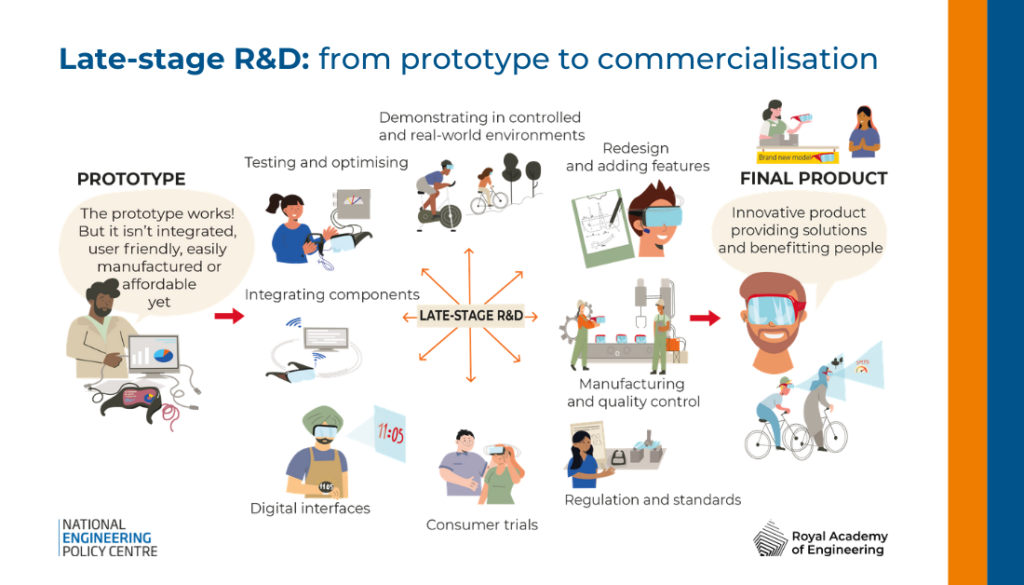It was an honour to be asked to contribute to this R&D report written by the National Engineering Policy Centre, led by the Royal Academy of Engineering.
The report warns that the government’s ambitions for the UK to be a leading global innovation-driven low-carbon economy are likely to fail unless it makes the UK a more attractive place for businesses to invest in and carry out late-stage research and development (R&D).
Late-stage R&D is a key part of the innovation process and accounts for the majority of R&D that businesses do. It is how they take a proof of concept or prototype through to commercial application, ultimately delivering new and improved products, processes, technologies and services to market and creating jobs in the process.
![]()
Late-stage R&D: business perspectives argues that the socio-economic benefits that result from late-stage R&D mean that there is a compelling case for the public sector to support it. The UK government also needs to improve incentives for business investment in late-stage R&D if it is to achieve its stated target of investing 2.4% of GDP into R&D by 2027 and 3% in the longer term, the report recommends. Private sector businesses currently contribute approximately two thirds of the UK’s R&D investment, much of it in late-stage R&D. To achieve its targets and avoid the looming shortfall in investment of around £20 billion, government must encourage businesses to invest a lot more in R&D, and quickly.
Late-stage R&D is iterative, non-linear and complex and carries risks arising from the scale of the technical challenge, cost, timings, certainty of market opportunity, competitive environment and opportunities or barriers to commercialisation. The study outlines that understanding these and the policy levers at government’s disposal is key to identifying actions that can be taken to ensure more late-stage R&D is carried out in the UK.
The National Engineering Policy Centre interviewed individuals responsible for R&D in 32 engineering businesses across a range of sectors, sizes and locations. The real-life examples gathered in the report highlight five common resources that are essential for conducting and managing risks associated with late-stage R&D, and that government can influence to help the UK become more attractive to business and internationally competitive. These are R&D infrastructure, investment, people, partnerships and market environment.
The report outlines a vision for 2027 in which the government’s ambitions that the UK is a global science superpower benefiting from innovation, growth and undergoing a green revolution are a reality and makes recommendations for how this could be achieved. These include:
- Place late-stage R&D at the heart of its Plan for Growth and upcoming innovation strategy
- Target support to late-stage R&D, with mechanisms that help businesses manage risk, filling gaps in current support
- Strengthen and scale existing initiatives, institutions and infrastructures that support late-stage R&D
- Signal and promote the UK’s offer for late-stage R&D and innovation to international investors
Professor Neville Jackson FREng, Chair of the working group behind the report, said: “It is hard to overstate the scale of challenge if the UK is to stay competitive on the global stage particularly given the context of COVID-19, new trading relationships and the imperative to ‘build back better’. There is a choice to be made—enable businesses to take bold risks here or they will go elsewhere. Innovation will happen irrespective of the UK’s policies, what is at stake is our ability to derive growth from our research base. Without an expanded late-stage R&D capability, we will lose the benefit from our creativity to our international competitors.”
“With better understanding of the risks involved for businesses in late-stage R&D and greater appetite to share this risk, the UK government could pave the way for more businesses to conduct these activities in the UK, reaping the returns from public investment in research whilst securing future growth and international competitiveness.”
Peter Mildon, our Chief Operating Officer comments – “I was delighted to contribute to this report, as late stage R&D is where the real value of scientific and engineering effort start to have a real world impact. Over the last few years, the learnings from our R&D projects in Milton Keynes and Manchester have converted into a Smart City product that is now being used in over 35 UK cities, and has revolutionised the way that traffic data can be gathered and used.”









